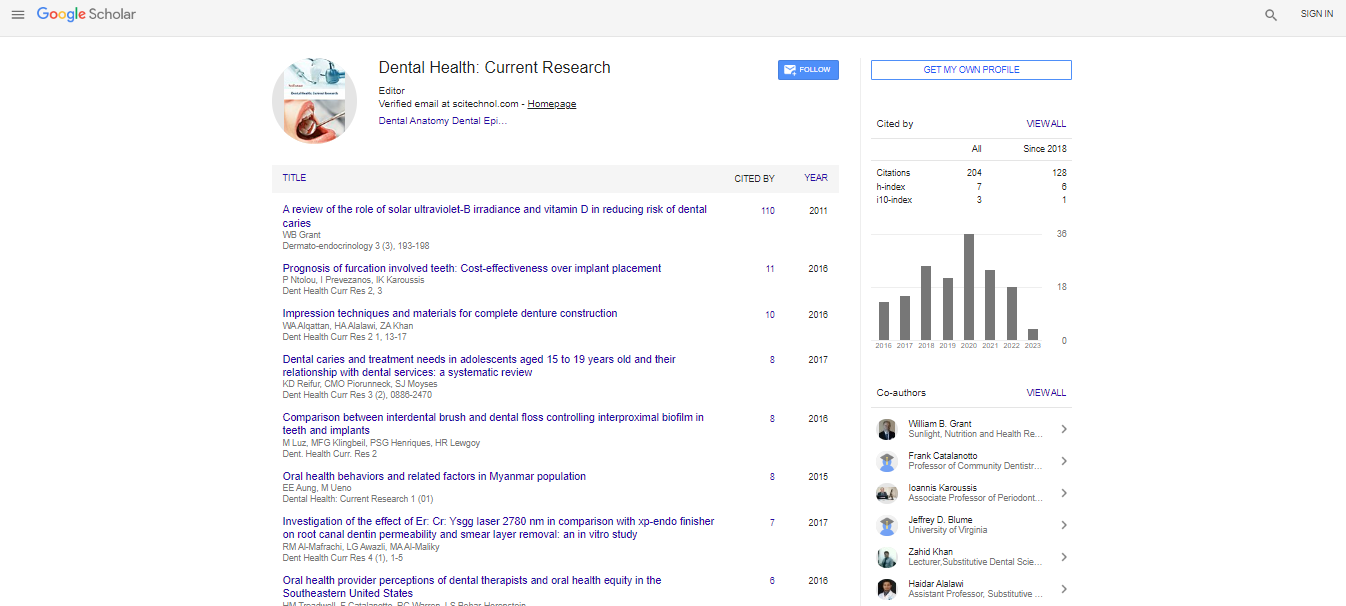Perspective, Dent Health Curr Res Vol: 9 Issue: 6
Eternal Enamel: Tactics for Lifelong Dental Health
Yiyiwang Pieng*
1Department of Oral and Maxillofacial Surgery, Hospital of Stomatology, Jilin University, Changchun, PR China
*Corresponding Author: Yiyiwang Pieng,
Department of Oral and Maxillofacial
Surgery, Hospital of Stomatology, Jilin University, Changchun, PR China
E-mail: yipieng@gmail.com
Received Date: 27 November, 2023, Manuscript No. DHCR-24-123809;
Editor assigned Date: 30 November, 2023, Pre QC No. DHCR-24-123809 (PQ);
Reviewed Date: 14 December, 2023, QC No. DHCR-24-123809;
Revised Date: 21 December, 2023, Manuscript No. DHCR-24-123809 (R);
Published Date: 28 December, 2023 DOI: 10.4172/2470-0886.1000191
Citation: Pieng Y (2023) Eternal Enamel: Tactics for Lifelong Dental Health. Dent Health Curr Res 9:6.
Description
Maintaining optimal dental health throughout one's life is crucial for not only a radiant smile but also for overall well-being. The phrase "Teeth for a Lifetime" embodies the concept that with proper care and attention, individuals can preserve their natural teeth for the duration of their lives. In this comprehensive guide, we will explore various strategies and habits that contribute to long-term dental health.
Establishing a solid foundation
The journey to a lifetime of healthy teeth begins in childhood. Early dental care is fundamental to establishing a solid foundation for oral health. Parents play a crucial role in instilling good oral hygiene habits in their children, starting with regular brushing, flossing, and routine dental check-ups. These early practices lay the groundwork for a lifetime of dental wellness.
Embracing proper oral hygiene habits: One of the cornerstones of maintaining teeth for a lifetime is a consistent and effective oral hygiene routine. Brushing teeth at least twice a day with fluoride toothpaste helps remove plaque and prevent cavities. Additionally, daily flossing is essential for removing plaque between teeth and along the gumline, where a toothbrush may not reach. Using an antiseptic mouthwash can also aid in reducing bacteria and promoting gum health.
Regular dental check-ups: Preventive care is a crucial aspect of long-term dental health. Regular dental check-ups, typically recommended every six months, allow dental professionals to detect and address issues early on. These appointments include professional cleanings, which remove plaque and tartar that may be challenging to eliminate with regular brushing and flossing alone. Early detection of dental problems can prevent more significant issues and contribute to the longevity of one's natural teeth.
A balanced diet for dental health: Nutrition plays a vital role in overall health, including dental health. A balanced diet that is rich in vitamins and minerals, particularly calcium and vitamin D, is essential for maintaining strong teeth and gums. Avoiding excessive consumption of sugary and acidic foods is also crucial, as these can contribute to tooth decay and erosion. Drinking plenty of water helps flush away food particles and promotes saliva production, which aids in neutralizing acids and maintaining a healthy oral environment.
Protecting teeth from injury: Accidents happen, but taking steps to protect teeth from injury is another strategy for ensuring longterm dental health. Wearing mouthguards during sports activities, avoiding habits like nail-biting, and refraining from using teeth as tools to open packages can prevent unnecessary trauma to the teeth. In the event of an injury, seeking prompt dental attention is crucial to minimizing potential long-term damage.
Managing stress for oral health: Stress can manifest in various ways, and one often overlooked aspect is its impact on oral health. Bruxism, or teeth grinding, is a common response to stress and can lead to worn-down teeth, jaw pain, and other issues. Managing stress through relaxation techniques, exercise, and mindfulness practices can contribute not only to overall well-being but also to the preservation of dental health.
Adapting to changes with aging: As individuals age, changes in oral health may occur. Maintaining good oral hygiene practices becomes even more critical to prevent issues such as gum disease, tooth decay, and tooth loss. Regular dental check-ups remain essential, and addressing any concerns promptly can contribute to the continued health of one's teeth well into the senior years.
Embracing advanced dental care: In some cases, advanced dental care may be necessary to address specific issues and preserve dental health. This can include treatments such as dental implants, crowns, and other restorative procedures. Embracing technological advancements in dentistry allows individuals to explore options that can enhance the longevity of their natural teeth.
Conclusion
Teeth for a lifetime is not an unattainable goal; rather, it is a commitment to a lifelong journey of good oral health practices. By establishing a solid foundation from childhood, embracing proper oral hygiene habits, prioritizing preventive care, maintaining a balanced diet, protecting teeth from injury, managing stress, adapting to changes with aging, and embracing advanced dental care when needed, individuals can increase their chances of preserving their natural teeth for a lifetime. A proactive approach to dental health not only results in a beautiful smile but also contributes to overall health and well-being.
 Spanish
Spanish  Chinese
Chinese  Russian
Russian  German
German  French
French  Japanese
Japanese  Portuguese
Portuguese  Hindi
Hindi 